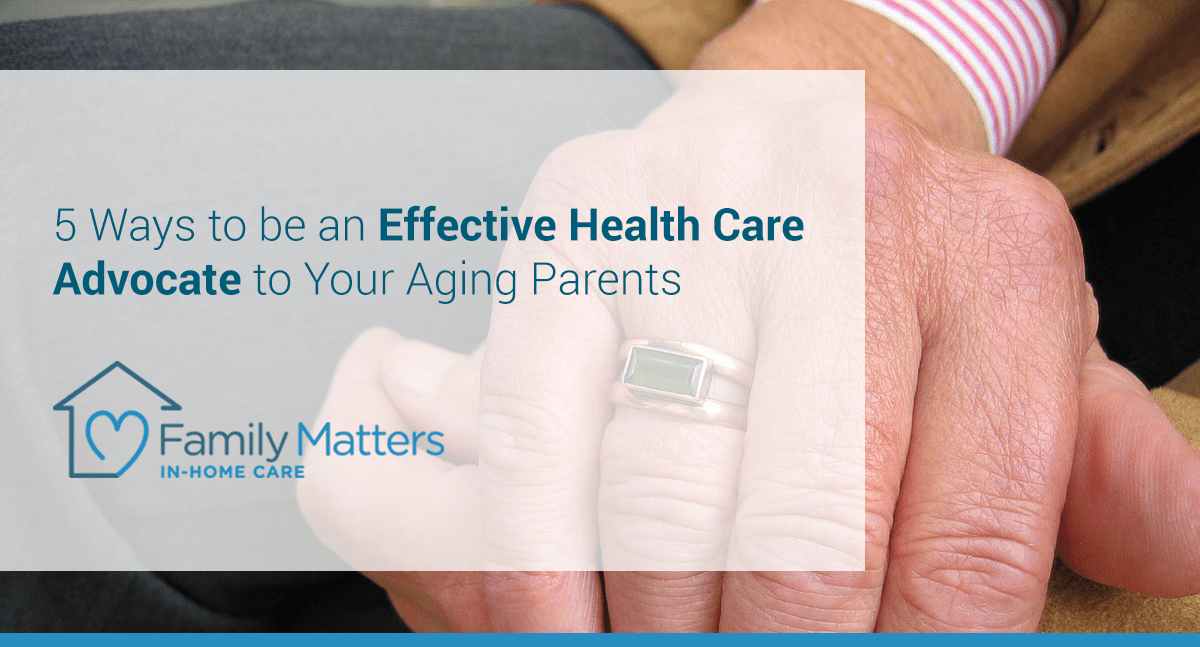
5 Ways to be an Effective Health Care Advocate to Your Aging Parents
It’s hard to imagine a scenario in which the tables are turned and you have to start taking care of your parents. This can be an understandably uncomfortable topic for both aging parents and their children to discuss. However, as people enter their senior years, it’s only natural that they would begin to experience health concerns like physical and mental illness, injuries, and other circumstances that leave them needing assistance.
Acting as a caregiver to aging parents can be overwhelming, to say the least, not only because of emotional concerns, but because many adult children have jobs, families, and busy lives of their own to contend with. For these reasons, many families choose to enlist the aid of caregivers to ensure that elderly loved ones have the help they need to cope with injury or illness, or even just manage daily activities.
Even with qualified help, however, you need to follow certain guidelines in order to be an effective advocate and act in the best interests of aging parents, who could be at high risk for being taken advantage of, depending on their situation. Here are a few tips if you want to be an effective health care advocate for your aging parents.
Understand parents’ wants and needs
The place to start is by having a conversation with your parents. You need to know their goals, plans, and wishes so that you can act on their behalf. You need to understand and respect their wishes as much as possible, and it’s a good idea to talk about these things long before your parents require the efforts of an advocate.
If you’re to become an advocate at some point, your parents will need to provide you with information about wills, trusts, pensions, life insurance, bank accounts, and more, and it’s probably best if they have some kind of plan in place to provide you with needed financial documents should they become incapacitated. As an advocate, you’ll also need your parents to assign you power of attorney to manage their estate if they become incapacitated.
Speak with specialists
Unless you’re a doctor or nurse, you may not be qualified to shoulder the burden of providing certain types of care for your elderly parents. You might not understand how to manage nutrition and exercise for your parents, how to fulfill their social and emotional needs, or how to provide the overall care they need to continue leading active and fulfilling lives.
There are all kinds of specialists that can help you, from doctors and nurses to in-home caregivers and companions. As a family member, you should do your best to stay in contact with aging parents and provide what help you can. As an advocate, you’ll need consult with specialists to ensure they’re getting proper care, whether it’s from you or professional service providers.
Keep tabs on care
Finding and hiring suitable caregivers can reduce the burden on you to provide care, but as an advocate, you can’t rest on your laurels. You need to ask questions, stay involved, and make sure you’re clear about the care your parents receive.
Stay organized
Being an advocate is a multi-faceted occupation. You need to keep track of health concerns, finances, and the general well-being of your parents. It can be a lot to deal with, so you need to manage the tasks you can, use appropriate tools for organization, and delegate tasks to family members and caregivers so you don’t get burned out.
Take care of yourself
This is a biggie. If you don’t take care of yourself, you can’t take care of others, and your parents are relying on you to act as their advocate when they are no longer able to care for themselves or make decisions on their own behalf. Make sure to ask for help when you need it so you don’t get overwhelmed.
If you or your family member is considering in-home care as part of a plan to age in place, contact Family Matters In-Home Care today for a free consultation. Our team is dedicated to supporting your family and helping older adults enjoy life in the comfort of their own home for as long as possible.
Some of the services offered by Family Matter In-Home Care include: Alzheimer’s & Dementia Care, Bed & Wheelchair Transfer Assistance, Companionship, Housekeeping & Meal Preparation, Personal Care, Recovery Care, and Transportation.
